Ask any financial advisor, and they’ll tell you that you should have at least enough money in savings to cover three months worth of bills. That’s before you start working on any real investments. We are all prone to the possibility of losing our jobs, having a downturn in our business, or having an accident that keeps us from working. Should any of those things happen, that money would keep us afloat, while we got a new job or made other financial arrangements.
There’s nothing wrong with that advice, from a purely financial standpoint. If you or I should suffer any sort of personal catastrophe, it is likely that we will need money to help us through. That’s the idea behind such advice and it’s good advice up to a point.
The problem is that advice doesn’t take into account anything other than a personal financial crisis. Should we find ourselves dealing with any other sort of crisis, that money may not do us the least bit of good. That would be especially true in a situation where we are faced with a financial collapse or the general breakdown of society.
In those cases, there’s a very strong possibility that people won’t be accepting cash and may not be able to accept payment electronically. So much for that cash reserve; doesn’t look too useful in that light.
Even so, the basic idea of having a reserve is a good idea. I mean, isn’t that what we preppers do all the time? Isn’t the foundational premise of prepping that of making sure we stockpile things of value in good times, so that we will have them available to us in the bad ones?
So how do we keep our money safe, through those situations, while also keeping it accessible so that we can use it when those situations arrive? That can be challenging, but there are some strategies that we can use:
As Far as Cash Goes
 To start out with, always keep some cash on hand. There are many emergencies we can face in life, which can be solved by just having cash. If you can, try to have about $1,000 in your home at all times. If that’s too much, then keep what you can.
To start out with, always keep some cash on hand. There are many emergencies we can face in life, which can be solved by just having cash. If you can, try to have about $1,000 in your home at all times. If that’s too much, then keep what you can.
When a disaster first strikes, chances are pretty good that you’ll need some cash, even if it is for nothing more than to fill your gas tank. Even in cases where there is a total collapse of society and our monetary system, people will still accept money for a few days. The trick is noticing that you’re in such a time and spending the money on anything you need, before people decide to not accept it anymore.
The other advantage of keeping cash on hand is that it won’t be affected by a run on the banks or the banks closing down. Considering how low interest rates have been the last couple of years, it’s not like you’re losing money by having it hidden in your home, rather than having it hidden in a savings account somewhere.
Related: 10 Expenses You Need to Cut Now for the Upcoming Economic Depression
Buy Ahead
Any other money that you have needs to be invested. But just how should you invest it? You need an investment that not only protects your money from market forces, but also protects it in the midst of a major disaster; what we call a TEOTWAWKI event.
Of course, investing in silver does that, but that doesn’t mean that you want to invest all our money in silver. Personally, I’d recommend against it. It may take time, after a disaster, for people to start accepting silver in trade. During that time, your silver isn’t doing anything for you. It’s just sitting there, taking up space and requiring that you keep it safe.
Here’s a different way of looking at that: invest in buying things that you’ll need sometime in the future, by buying them today. Doing so means that you are able to buy those things at a cheaper price, than if you bought them in five to 10 years. Then, when you use those things, you can take the money you would have had to spend on them as a profit.
The key here is knowing what you’ll need in the future. Buying a wheelchair, because you might need it in the future probably isn’t a good idea, because you really don’t know if you’re going to need it. The same can be said for many other things. Your investment has to be in something you’re sure you’ll need.
Make an Investment
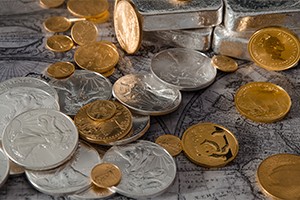 Ok, so how do we get from that $1,000 to the three months worth of expenses that investment experts say we should have on hand?
Ok, so how do we get from that $1,000 to the three months worth of expenses that investment experts say we should have on hand?
We still might find ourselves in the situation where we need that money for a personal financial disaster, so it makes sense to have it. But at the same time, that much cash isn’t going to be useful in a TEOTWAWKI event.
The only way to accomplish both is to invest that money in something that is easily liquidated and will be valuable in both normal times and a post-disaster scenario. That means precious metals, specifically, silver.
While both gold and silver are easily converted to cash and will most likely be acceptable for barter in a post-disaster world, there’s a huge difference between trying to barter silver that’s worth $15 to $20 an ounce, and gold, that’s worth $1,500 to $2,500 an ounce. Unless you are trading for something valuable, like buying a vehicle or property, you’re going to have a hard time using that gold in a world where people are bartering for what they need.
While some people may be unwilling to barter for silver in a post-disaster world, especially at the beginning, there’s a high probability that it will gradually become the medium of exchange, as people become accustomed to the new normal. That may not happen quickly, but it will most likely happen.
One of the Best Investments to Make
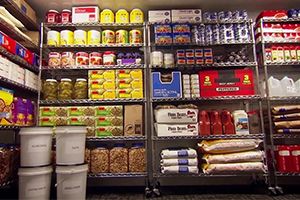 Believe it or not, one of the best investments we can make today is food. While the overall consumer inflation rate has been hovering around one percent per year for the last several years, food has gone up by an average of eight percent. That’s a faster rise in value than just about any other investment you can find.
Believe it or not, one of the best investments we can make today is food. While the overall consumer inflation rate has been hovering around one percent per year for the last several years, food has gone up by an average of eight percent. That’s a faster rise in value than just about any other investment you can find.
What this means is that if you buy $1,000 worth of food today and keep it for five years, it will be worth $1,469.33. That’s almost a 50% increase in value, assuming that the inflation rate of food remains constant. With a low overall inflation rate, that’s a huge amount of gain.
Investing in food does two things for you: it increases your stockpile, ensuring that you’ll have food to eat in the future and it provides a good investment. Since you will always need food, you won’t need to worry about being able to sell your food to someone else, in order to cash in on it.
You can literally “sell” it to yourself, taking the money you would otherwise have had to spend on food and use it for other things. In other words, you can invest $1,000 today and pay yourself back $1,469.33 or so in five years.
Expand that to Barter Goods
You don’t have to limit that investment to food either, you can also invest in barter goods of all kinds. Anything that is likely to be in shortage in the wake of a disaster is worth investing in. I’ll guarantee you, if I had known there would be a run on toilet paper, I would have invested heavily in it last December, before the rush.
In any post-disaster world, people will not only be looking for toilet paper, but a host of other things as well. If you’re the one who has them, then you can trade what you have, for what they need. People can literally become rich this way.
During World War II, people in the cities of occupied Europe would travel out to the farmlands with suitcases full of silver and other valuables, for the ostentatious purpose of visiting “family”. The family they were visiting were farmers, who were willing to barter hams, sausages, cheese and butter for silver on the black market. When the war was over, many of those farmers became rich, selling all the silver they had bartered for during the war.
Related: How $5 A Week Can Get Your Family 295 Pounds Of Food
The key, of course, is to have what people will need. While some things (like TP) are obvious, some are not. But even the obvious things may not be all that profitable, if there are a lot of other people who have it too. A hoard of 4,000 rolls of toilet paper isn’t going to be all that profitable, if you’re across the street from a warehouse full of 20,000 rolls.
To make sure that you have things which will be profitable to have, be sure to diversify. Don’t put all your eggs in one basket. Rather, select a number of different things that you can invest in to help ensure that you will get a good return on your investment.
Since this is a dual-purpose investment, I’d recommend trying to invest as much as possible in things that you can use. That way, if you never barter those things in the wake of a disaster, you can still make money off of your investment, just like we talked about with food. It might be 20 years before you decide to start using those 4,000 rolls of toilet paper, but when you do, you’ll save a whole lot more, by not having to buy it, than you invested in it in the first place.
You may also like:
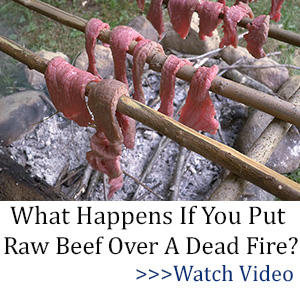 The Best States to Outlive an Economic Depression
The Best States to Outlive an Economic Depression
Do You Make These Fatal Mistakes In A Crisis? (Video)
Survival Items Lewis and Clark Had with Them on Their Two-Year Journey
I Lived In A Post-SHTF World For 3 Years, And This Is What I Learned

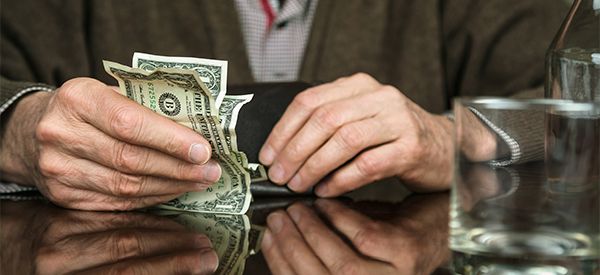

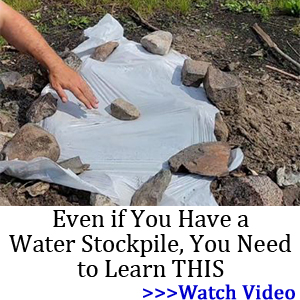



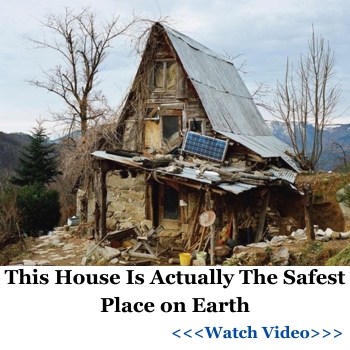
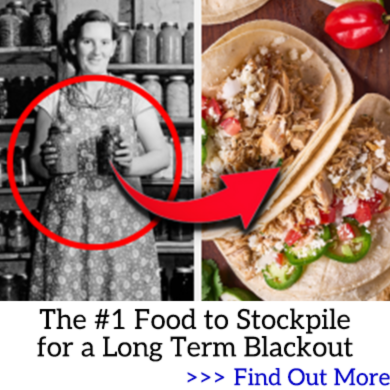






Also, things you may not use personally, but may find of great value are things I like to call “Humanity Commodities”: Things like small $3 bottles of Vodka, Which has great medicinal purposes, as well as the traditional uses, or other types of alcohol. Or maybe bags of roll-your-own tobacco. if ran through your solar dehydrator for a few days, it will become sufficiently dry enough to simply vacuum seal, or use the same oven canning method used to can flour, but in half-pints or quarter-pints. These kinds of “sin commodities” will help people feel more human again, and will be items that would be extremely valuable. Also, First aid supplies, such as bandages, splints, braces, ointments, creams, and gels, antibiotics and anti-inflammatories would be in great demand, and short supply. Any local dollar store will have these items cheap, and they are small and easy to store.
For many years, I’ve been investing in manual tools. Something few people here in the city think have no useful value or are a waste of time, money and energy I actually had my son’s mother-in-Law ask me if I don’t have an electrical mixer when I whipped out the hand mixer to make whipped cream for dessert one Christmas! Well, yes I do I replied! Several kinds, but this is a family tradition!
Tobacco products would also fall into this category, but can go stale more quicker than bottled booze.. Coffee would also be a good staple to stock up on for use or barter.
I don’t know. I think tobacco users, when push comes to shove, don’t care if the cigarettes are stale or not. I can remember in the mid 50s. some of the C-rations still had Lucky Strike green which were from the 1943-44 era and they still got smoked just as if they had just come off the assembly line.
It’s like some of the posters here who just don’t get what some of us are talking about when they talk about the dangers of water stored in plastic bottles or canned food with too much salt or certain canned meats that they just won’t eat. After 5 days with only water, it is my opinion that they will suck down a can of Spam unheated and be immensely grateful that they found it under a gondola in a burned out Safeway.
After a week without cigs, I think a dedicated smoker will be happy to suck anything containing tobacco into his lungs and be happy to trade his wife for a full pack of even Lucky Strike Green even though they are almost a century old.
You’re right! We have laying chickens, but as they age they stop laying very much. That’s when most people have chicken dinner. But we’re in love with them, and thier named and some come when called, all the stuff we weren’t suppossed to do. But I bet after a couple months of not enough food, you forget thier names and start seeing golden brown dripping fat backed chicken coming out of the oven, every time you look at your “pets!”
I read the book “One Second After,” and they kept thier dogs close to home because people would eat them.
LCC: Guess I’m an exception. If I have no tobacco, it doesn’t bother me. If it’s here, then I get the urge.
In a comment on rats and garbage, you mention the Plague. It’s endemic in every state and usually comes in with illegal immigrants.Any rodent can carry it, and since they started testing the fleas have been found on all animals, tho the fleas are species specific and will die from the wrong blood, they still carry it. I joke about Mouser the rattler, but I’d rather trust her to behave than rodent fleas. She would grab a sick animal in a heartbeat, and cannot pass on diseases.
Dogs will be vital after SHTF to control rats. Ever time a plague or famine hit an area, rats fed on the dead and thrived.
Wild tobacco (native wivian) is growing all over despite no rain for weeks. Every place but where I planted it, of course. Birds ripped thru all the garden patches and ate the seeds.May it rain! niio
JBW: Tobacco stale as in it dries quickly, and if kept sealed, then, will keep for years. If the alcohol content in booze isn’t high enough, it rots, like skunked beer. Coffee should remain whole beans and sealed. IN any SHTF scenario, beer is best kept as grain. Beer was used by all but fanatics, and even children were given ‘green’ beer to drink rather than risk death from drinking water. Missouri is a good state for hops. We have a new varieties in Arizona, selected from native hops. niio
I haven’t been in a store since early March, and have been finding all kinds of stuff I forgot that I had. I have been using up pounds of old rolling tobacco that I forgot in a big cardboard box years ago. It dries out in the sealed bags, but a mist sprayer with water and a little time brings it right back to good rolling and good tasting.
I have had bottles of 60 proof schnapps and other various 80 proof whiskeys and vodkas that sat in a vacant hunting shack for years and still taste fine. Many of these were partly consumed and left to sit for ages half-full.
Klaus: Around here, Arizona, you leave a bag of anything open an hour and it’s dried enough to store 🙂 Thank God for glass and good caps. They dig up jars (stoneware) all the time with the dried remains of beer and wine in them and all the archaeologists say is, “Didn’t those silly injuns know you can’t preserve fruit just by putting it in a jar?” Jars were capped with sloth and wet clay, then buried till needed, usually in winter when they needed vitamin C to prevent scurvy.
Dad had lost a bottle of schnapps but ten years later when renovating the kitchen found it had slipped into a hollow next to the cabinet door under the sink. Still tasted fine to us.
niio, walk in beauty
With just a few exceptions like Baileys or Eierliquor, (Eggnogg Liquor), which should be refrigerated once opened, both schnapps and booze stay good on the shelf forever – opened or sealed. I’ve had bottles on the shelf for 40 years. No problem.
Be careful what you buy at Dollar Stores. Now they are $1.25 Stores. Many times what LOOKS like a bargain really isn’t so check prices. Check expiration dates as many times they will buy bulk items close to expiration dates. Toothpaste is sometimes from other countries that don’t have the same FDA type approvals as we do. Just be sure of what you are buying and check prices.
I don’t buy anything there. Money goes directly to China!
This article is so useful. Everything on this page is important. PAY ATTENTION PEEPS!
ostensibly.
I try to save items that have a use, don’t cost much or are free and don’t take up a bunch of room. For example:
I cut newspaper and paper bags into 7 x 9 pieces and store them in the steady stream of Amazon boxes that are 9 x 10. In an end of the world situation toilet paper will eventually run out. I already get the newspaper, so there is no additional cost. It will be a trade item (or my use when worst comes to worst) for when folks have run out of t.p. In order to keep bugs out I double wrap them in plastic bags that products sometimes come in. I used to use the t-grocery bags until they started selling them for a dime each. I make sure the seams are sealed with packing tape. The is the one item of expense. The rest is free or paid for by another use.
I save buttons from any worn out clothing that I am discarding. I also save any zippers and velcro sets from clothing going in the recycle bin. Even if it is to be used for rags, it doesn’t need buttons, zippers or velcro. Those sewing items will be valuable when they are no longer available.
Thought provoking. I’ve invested in well sealed coffee also.
Clergylady, thank you for this info! I’ll have to do that too! I’ve been stocking bottles of freeze dried coffee. Can’t imagine life without at least one cup in the morning!
After seeing numerous seed suppliers sell out as Covidia came to visit last spring I am going to invest every year in twice as much as much seed as I need for a big garden. kept cool and dry seeds last 2-4 years, so if you manage your stock well you can build a potentially valuable investment. And if i get even more appalled at the direction the world is going I might start buying a couple hundred dollars worth of corn and pinto bean seed every year, just in case the time comes when I need to trade some grain for one of my neighbor’s steers.
And there was an article the other day on investing in firearms, how about investing in hand tools? You can use my brace and bit this week and I get half a dozen eggs.
And maybe the best investment, useful skills.
Bagged dry beans will sprout. Dried brown rice will also sprout. i am sure many other dried seed products would sprout. Its a cheap source of seed stock. Get a small bag to check for viability then go bigger if it proves to grow. Field corn is cheap and could be a form of micro green. Even in winter grown inside.
Another use of sprouted seeds are to make malt for brewing. The sprouted seed contains an enzyme that changes starch to sugar for the yeast to eat. Thanks.
bert: If any is imported, it has to be irradiated. It’s harmless to us, but kills the seed. Most of what we buy today is GMO. We need 350 lbs shell corn and same in pintos per person. Yo, sprouts are modern farming, at that. While feeding grain makes animals sick, like feeding candy to kids, sprouts don’t. maize makes good beer, which is a food. niio
Mike: Corn makes good beer. Sprout, do not let the peg for leaves, dry in oven or brew fresh. a touch of hops offsets the sweetness. Leftovers from the brewing are high protein, up to 35%, and even if you don’t want it, the cattle will. Years ago brewer’s wastes dried sold for 15 bucks for 20 lbs. A neighbor’s truck died so yesterday I ran him down to Tucson. I refused to take gas money and said he has figs and oranges, just give me some when they ripen. niio
Nothing here on “Keeping Your Money Safe”, as the title implies.
I thought same as I read title which is why I chose to read…hello??
That was covered. The idea is that in time even the almighty dollar and all other currency will fail. When that happens and you wish to buy and sell to get what you need then you just might want to think about an alternative type of currency you can use. That was also covered. If you prepare in that manner then your money is safe in an alternate way.
Yes, I agree, there is nothing about keeping your money safe, but I would suggest you look past the title and understand that “money” is determined by the times and economy. Having a big screen TV and a BMW used to imply a wealthy person, but now, just about anybody can own those. An expensive car loses most of its value once it is driven off the lot. While you MAY be able to sell the car, will you get the price you want, or paid for it? Is it better to put your money in a savings account or high yield bond, or into food, ammo, tools, or something that will hold its value or even increase in value? If you buy 5 pounds of beans for $2.50 today, and those same beans cost you $5.00 next year, isn’t that a good return on your investment?
Can you eat those new shoes or big screen TV? If a fire happens in your house, what will you save? The US Dollar may be worthless in a year, so if you haven’t invested for the future, what will you be worth? A person that owns a sports car now may wish they had purchased a good Jeep/SUV instead. That big screen TV won’t be worth a dime if there is no power.
I would rather keep up with the Clampett’s instead of the Jones’s. At least Jed could survive off the land.
That was covered. The idea is that in time even the almighty dollar and all other currency will fail. When that happens and you wish to buy and sell to get what you need then you just might want to think about an alternative type of currency you can use. That was also covered. If you prepare in that manner then your money is safe in an alternate way.
Go read the Wall Street Journal or the Financial Times! You will quickly learn that money as defined is something of measured value that can be exchanged for other things of value. Then reread this article. Especially the passages that give sound advice regarding investments in food and non perishable items. You can amass a huge amount of money in stocks, bonds, real estate, gold, and silver, commodities, but unless you have something in the cupboards and to eat your actually a very poor man.
CC: good post. niio
Hey, Rich! yes, and shell corn can be bought for about $5.00 a bushel at feed stores. Same with most grains. Freeze for a few days it to kill the bugs, mix with something to chase or kill insects (we have a bay laurel, Zone 9) and use diatomacious earth (food grade, $15.00/15 lbs).
Penny jar. there’s a coin shortage because people are ‘hoarding’ coins. We only save silver coins and pennies minted before 1986, which are pure copper. we also know where to go to get a very rich copper ore (plenty of it all over the area). After the troubles die back, metal will have a lot of value.
Where I live, we have a lot of down side. Plenty of cattle, but most are Brahma crossbreds, and they tend to be killers. the bighorn wilderness fire wiped out more than 114,000 acres and would have taken a lot more were it not for well-trained, efficient firefighters (there were 4 brush fires all going on at once). Most of our rivers have no water! we’re drought-prone and currently 2.56 inches below average. Not good when average is 13-16 inches. Large dogs like pit bulls, German Shepherds, and rotties are common. Very friendly but all can go wild fast.People come up here and dump them. Most are found, but ranchers still have a running battle with wild dogs. Coyotes are common and eat a lot of them, but will eat a child, as well. All wild animals are deadly. Rodents can carry hauntavirus and the plague.
Best bennies, if you know how to cook it, most local (desert) plants make food. Some are so toxic even smoke from the wood is poisonous, like mescal beans. Most berries and fruit are good, but mind thorns and rattles (does not play well with others). wheat gets rust fast. Maize does well, but we have dwarf maize mosaic, which kills it. Sorghum and cowpeas are good summer crops if the birds and javelina don’t get to them. We also have 3 malaria mosquitoes and one filaria mosquito (it lays a maggot nest to the eye which eats out the eye). All ants are fire ants, but they can be a bennie. Insect pests can be dumped on the mound. Hit the mound with a stick and run. for generations afterward, the ants will actively hunt out those insects and kill them. we had a problem with kissing bugs (dangerous, they carry a disease) and did that. No more kissing bugs.
Water, most municipalities and ranchers are going solar, so they have water. All water must be suspect of carrying diseases, the monsters that eat us.
One average Arizona suntea bottle will hold up to $70.00 in coins.the bottles reseal well and can be buried for future use. niio
Heads up on envelopes of seeds delivered to Europe, US, and Canada–they are contaminated and will destroy your gardens or anything within reach–they are deadly.
Burn them and sanitize hands.
It sounds like the verticillium wilt I have had for 5 years now and it has destroyed many of my plants/shrubs/flowers…..I can’t grow tomatoes and cucumbers any longer. I will never get rid of it.
JayJay: All seeds or just seeds from specific countries?Such as or BFFs to the west of us.
I missed the obvious…….China is sending these packets to four states so far…online several articles written about this.
Today, the suggestion is it is Kudzu.
Jay, did you try tubs and clean soil? Here’s something fro Arizona on wilt. niio
https://cals.arizona.edu/forageandgrain/sites/cals.arizona.edu.forageandgrain/files/az1034.pdf
This wilt is so dangerous, I took it to a nursery where I have bought trees, shrubs and a few flowers since I moved here 12 years ago.
Understandably, he was perplexed when I showed him the plant in a black trash bag away from all plants and not touching any part of it.
3 years later, this same man had to destroy all his rose bushes and told me he would never sell a rose bush again.
Another nursery owner told me not long after that happened that he heard others talking about the wilt and destroying plants because of it.
We better pray to God this doesn’t spread..I read to kill it, cover all affected areas with black plastic, leave for one full year esp. summer months to let sun heat ground and kill fungus in the soil, etc.
That is unrealistic as my entire acre is affected.
Back, sides, front—all have problems and I have resorted to buying only plants stated resistant to the wilt.
Kentucky is corn/wheat/soy beans/tomatoes country.
God help us is all I can say. I’ve lost lots of money in plants that were contaminated, plants I tried to grow.
Thanks for the article, but this is too big for an amateur like me to handle.
I think what Rich is saying is “Don’t keep all of your eggs in one basket.”
1. Don’t keep all of your liquid assets in a bank.
2. Have as much currency as you can afford to keep at home.
3. Put some of your assets in silver as opposed to gold, unless you have so much money, that you would need a Brinks truck to haul all your silver. That would be a good time to consider converting some silver to gold.
4. Put some of your assets in stuff you can use between now and the ETOW. Like food, beverages, tobacco, alcohol, more food, more beverages tobacco, alcohol.
5. Put some of your assets in stuff you can trade with after the EOTW. Personal hygiene items, medical supplies, sewing supplies.
6. Hand tools will be more valuable after the ETOW after the fuel for your generator runs out and you don’t have any juice at all.
Along those lines, having a solar system and battery operated hand tools is going to be mighty comforting when you have your electric chain saw in one hand and the buck saw in the other. Even if you don’t go solar for your home, having a solar system that is sufficient to charge your battery operated hand tools will be a big help.
An interesting thing happened over the Fourth of July weekend relative to cash and banks.
I have a relative who lives in Bakersfield, CA. On July 4th he texted me that he and relatives of his wife were unable to get cash from two different branches of Wells Fargo and Bank of America. At one BofA branch some guy came out and said they were out of cash at that branch and so the ATMs would be down all weekend.
That is very strange that four individual branches of two major banks would be out of cash on the Friday before a long weekend. Maybe there is a rational explanation but it doesn’t occur to me.
My relative was able to get cash from an ATM at a credit union where he also banks.
Neither ATM cards nor EBT cards (I didn’t know one could get cash with an EBT card. I thought they were for groceries only.) would work at the four branches visited.
I had gone to my bank and gotten cash on Thursday because I figured the lines would be longer on Friday than I cared to contemplate.
After his text I went to the Bank of America branch I usually use. There were three people using the 3 machines when I got there. They all seemed to get cash from each of the machines without any trouble. I also got more cash from the machine without any difficulty.
Bakersfield has a population of about 350,000 people and is located on I-5/US99. It is only a 2-hour drive from Los Angles. So it is not some remote small town such as Bishop or Lone Pine.
I thought I would mention this episode on this site to see if any other followers of this site experienced similar problems over the 4th weekend.
I can understand, perhaps, one inexperienced bank manager not ordering enough cash for the Fourth weekend which was a weekend that a lot of recreational sites opened for the first time in a long time. It also was the weekend that the EBT cards got reloaded for July, but I really can’t fathom why there would be four such inept or inexperienced bank managers of major banks who exhibited such a lack of foresight.
My relative is kind of skeptical of my preparations for some emergency. The last three months, however, and especially the ATM problem have made him start to take prepping more seriously. He indicated to me that he was going to make sure that they maintained a supply of cash on hand in the future.
It is interesting because he is the relative that was hunting during the Northridge earthquake and experienced the cash only situation in a small town about 600 miles north of Los Angeles. The computers that handled the ATMs and credit card acceptance were off line due to the earthquake and all businesses were cash only. He always carries cash when he goes on hunting trips because sometimes in some of the areas he hunts small stores don’t accept credit cards. So the cash only policy didn’t affect him when he went to fill up to come home.
There are a million logical reasons why this has happened, especially with COVID19 since most banks use outsourced services to maintain their ATMs. Not too sure if there is a banking regulation regarding keeping individual ATMs up and running, but banking services can not be down longer than three days. Banks are required to have a business continuity and preparedness plan in place to support it. Routine testing is mandated as part of the plan. That said, it’s always good to keep cash on hand for emergencies as part of your own plan.
I didn’t follow the holiday schedule carefully as I had no big plans for the weekend. I think that Monday was the official celebration of the Fourth even though Saturday was the actual Fourth. I suppose three days is three working days which means if they were open for business on Tuesday, they would meet the three-day mandate.
It just seemed like a very strange coincidence that four branches of two major banks were out of cash early on Friday before a 3-day holiday. Of course, everyone knows that I am paranoid when it comes to everything governmental, seeing evil even when such might be very remotely existent.
I actually knew a guy who heard voices and kept aluminum foil on all his windows to block them. He was actually a very nice guy and quite intelligent until you got him talking about the voices.
My experience has been that some BOA branches are incompetent, and don’t seem to improve. No one really knows how much Wells Fargo stole from consumers the last few years, between 500 million and 3 billion. The banks scare me. As a wild eyed liberal I know I want Government to help the poor, but I’m still glad Obama bailed out the Big Banks instead.
Quite a few years ago BofA purged all of their experienced tellers and branch personnel. What they hired in their place were part timers. Well, guess how well that worked.
In some places like San Francisco where some customers had been banking at a branch since it was the Bank of Italy, suddenly the tellers who knew them, had cashed their checks for years, knew their family and children, were gone and some young, part-time, brain-lame teller was asking them for id to cash a $50 check which they had been doing for perhaps the last 25 years without the teller asking Sam Giovanni for id to cash a $50 check. The old teller usually addressed him by name and inquired about his wife’s arthritis and how his oldest grandchild was doing in his first year of college.
It didn’t take anybody on the platform side to realize that retail banking was a dead end career-wise and they started looking around for something that had a tad more likelihood of longevity.
I don’t know if other banks followed that same pattern, but BofA wound up with a lot of lower management that were too dull to realize that they had reached the pinnacle of their career as assistant manager of a branch with the “manager” covering three or four branches.
Anyone with a brain in banking quickly realizes that retail banking is a dead end street. The ones with ambition are heading into other endeavors in the financial field.
That’s why at BofA, most of the folks, not all by a long shot, but most of the folks have barely enough brains to tie their own shoes. The ATM at the local BofA where I get my cash has more brains than all of the folks inside put together. And it’s the main branch for our town.
LCC, it could have been they were waiting for their cash to be delivered. When i worked in banking, we had certain days our cash was delivered. In rare instances we could have an emergency order made, but it really had to be dire for us to do that. Each branch was allowed a certain amount to have on hand, and you were not supposed to go over that amount.
While it was never said specifically to me, I always figured that was the amount the branch was insured for, so if we went over that amount and the entire amount was taken in a robbery, the insurance wouldn’t cover the overage.
One place where i worked, there was my bank and another bank at the other end of the shopping center. About 10 minutes away were two other bank offices for a third bank. All of us were running short one day when there as a bad traffic accident and the armored truck was stuck in traffic.
If a power outage occurred, which happened a couple times, we had to close our office and direct people to the nearest location that had power.
At the last bank where I worked, we were a small town sort of bank. Our ATM got quite a bit of traffic, and it would sometimes run out of money. One weekend was a huge weekend as the town was celebrating its anniversary, and we filled the ATM twice. Tapped out come Monday morning. Granted, this was in the days before people used debit cards for everything.
But my money is that those branches were waiting for their armored truck delivery. No pun intended.
With regards to cash. Keep it in small denominations. 5’s and 10’s. Places may not be able to make change and you do not want to pay for a $25 item with a hundred dollar bill and get $75 back in change in front of a lot of people.
1. little greenish pieces of paper are not money, they are currency. Money has value because of what it’s made of. When I went to work in a truck stop at the age of 13, in 1963 we sold gas for 24.9 cents but the quarter we got was made of silver. Today if you take a silver quarter in to a coin shop and sell it for todays currency you can still buy a gallon of gas with it. Your $1000.00 worth of groceries don’t change in value, the value of your little green pieces of paper changes, going down as more little pieces of paper or squiggles in your computer are created.
2. Gods money is precious metals, always have been. brass, lead, steel, copper ect. also have value built in.
in the early 60″s we still had c rations some with lucky strike green , also had c rations one day a week to used them up the good old days need to go back to them